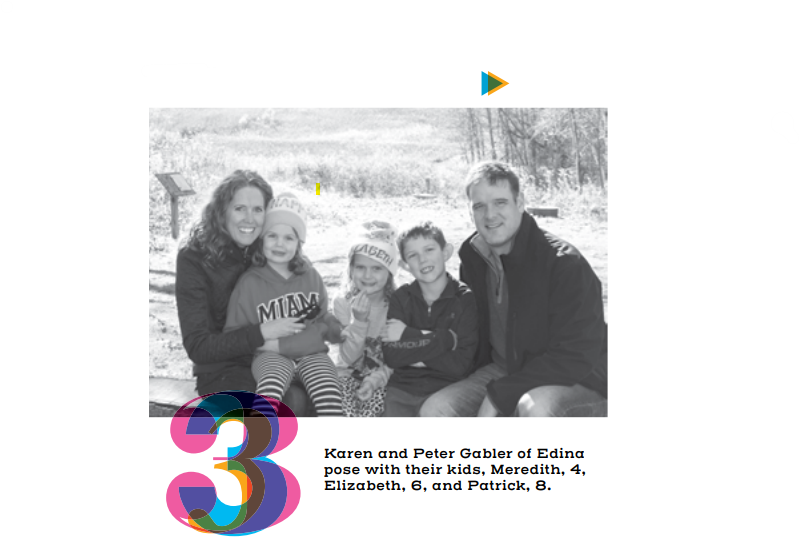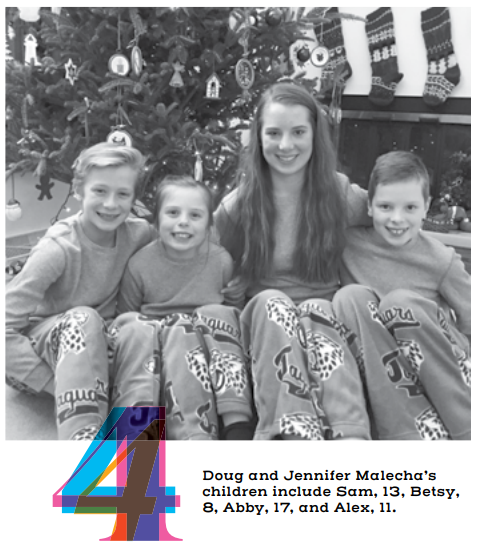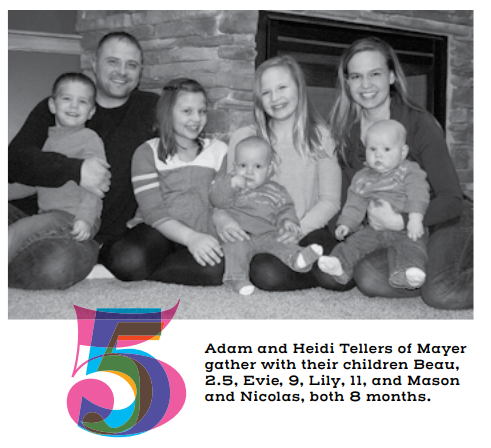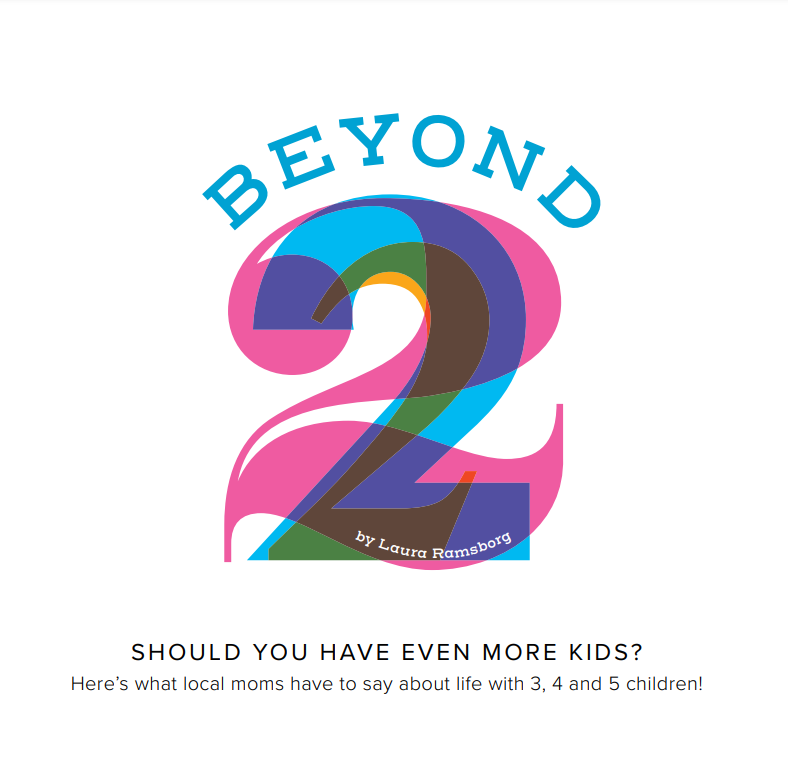When it comes to adding another child to your family — and perhaps taking the plunge to go beyond two kids — how do parents decide?
Even more important, how do parents make their bigger families work?
Forty-eight percent of Americans believe two children is the ideal number of children to have, according to a 2013 Pew Research Center study; 25 percent said the magic number is three; and 13 percent voted for four or more.
Yet, it’s not uncommon to know several families with three, four or five children. How did these larger families form and how are they making it work?
To find out, we talked with three local mothers who each have more than the “ideal” number of kids — Karen Gabler, a mother of three of Edina; Jennifer Malecha, a mother of four of Bloomington; and Heidi Tellers, a mother of five of Mayer. Through candid interviews, they shared how their families grew, what surprised them most about having a bigger family and advice for making it all work.

Karen and Peter Gabler of Edina pose with their kids, Meredith, 4, Elizabeth, 6, and Patrick, 8.
Taking the plunge
From the very beginning, some couples know exactly how many children they’d like to have in their families.
But for others, every addition to the family may be a separate decision.
Each person’s family experiences definitely play a role: Those from big families may be used to being part of a larger clan and may have always envisioned having many children of their own. Kids from two-child families may want to duplicate their experience.
Both Karen Gabler and her husband came from families of three, so the three-kid dynamic was what they knew and were familiar with growing up.
However, for Heidi Tellers, it took time to go beyond two. In the Tellers family, there’s nearly a seven-year difference between the second and third child. Sixteen months after her third baby was born, Tellers was surprised to be pregnant again and even more surprised to learn she was having twins!
Although Tellers admitted to being nervous and worried about meeting the needs of five children, now she wouldn’t have it any other way.
“Evenings are very chaotic, but overflowing with love,” she said.

Doug and Jennifer Malecha’s children include Sam, 13, Betsy, 8, Abby, 17, and Alex, 11.
Biggest surprises
For many parents-to-be, anxiety can set in as they envision what their growing families will be like — and try to anticipate what’s coming.
“Once I knew I was going to have five kids, I worried about everything.” Tellers said. “How would I find the time for each of my five kids individually? How would we afford everything that goes along with raising five kids? How would I find the time needed for our marriage? How would we manage the day-to-day tasks for a household with seven people?”
Tellers’ biggest surprise was that it’s all working wonderfully: “Although the worries still creep into my mind every now and then, I truly believe that things always have a way of working themselves out somehow.”
Both Tellers and her husband have full-time careers. But Tellers finds the most rewarding part of her day is returning home in the evening and being greeted by her children.
Jennifer Malecha, meanwhile, was surprised to discover the truth of the old parenting adage: “It doesn’t get easier, it gets different.”
New phases and different trials mean being dynamic and flexible as a parent — from the early years of coordinating naptimes and entertaining everyone over summer vacation, to now navigating school friendships and multiple activities.
Malecha said there’s another dynamic at work, however, that makes things a bit easier: Big families aren’t formed overnight.
“People say to me all the time, ‘I don’t know how you do it with four kids!’ But we didn’t have four kids all at once. We added to our family over time and adjusted to the new normal,” she said. “Now it’s not unusual for us to go in four different directions on a Saturday morning.”

Adam and Heidi Tellers of Mayer gather with their children Beau, 2.5, Evie, 9, Lily, 11, and Mason and Nicolas, both 8 months.
Sublime delight
Undoubtedly, parenting comes with numerous joys as well as challenges. There may be more of one than the other, depending upon where you’re at in your parenting journey.
Among the moms we interviewed, one of the greatest joys they found in parenting numerous children was watching them all grow into one-of-a-kind individuals.
“Seeing the unique personality of each child as they grow is one of my favorite things,” Tellers said.
Gabler agreed: “It blows my mind how different our three kids are. They are genetically the same, but so different. One is empathetic and wears his heart on his sleeve; one is 100 miles a minute, never slowing down; and another is the family comedian.”
Another source of joy the moms have found is the strong bonds that can form among siblings.
“Although their relationships are tumultuous at times, it’s awesome watching how they seek each other out for play, advice and company,” Malecha said.
Tellers added: “I love that my children will forever have a friend in each other during both childhood and as adults.”
The tumultuous times between siblings can actually count as a joy as well. Children in larger families often learn to share and compromise from an early age. Older children may more readily gain independence, responsibility and self-confidence.
For Gabler’s two older children, the birth of their younger sister meant more responsibility.
“They had to be a little more independent by doing things for themselves,” she said. “They had to rise to the occasion when the baby came along.”
Time and tough choices
One of the biggest challenges reported by the women we spoke to was universal — finding time — time for each child, time for partners and time to get it all done.
Malecha said scheduling is definitely a challenge. It’s difficult for both parents to be at one child’s event together.
“You are pulled in many directions,” Malecha said. “You can’t see everyone’s soccer/hockey/softball game. You need to make choices and compromises.”
Gabler agreed: “There’s a constant feeling of being behind on everything, or not doing enough. With three different people and three different schedules, something has to give — personal things, sleep, time with your spouse. You can’t expect to do it all.”
WORDS OF WISDOM
Among the women we interviewed, there are 12 children and 35 combined years of parenting experience. That’s a lot of available wisdom to tap into! Here’s their best advice for growing a happy, healthy family:
- LET IT GO. When you’re more than party of four — heck, even when you’re not — you have to make tough choices every day. Parents, it’s up to you to consciously prioritize what’s meaningful for you and your family and then make choices around those priorities. “Don’t feel bad if there are things you have to let go — relationships with people who don’t have kids, your house, planting flowers. I spend my time with my kids, making sure they are happy,” said Jennifer Malecha, a mother of four from Bloomington.
- DON’T LOSE IT. Your sense of humor, that is. It’s important to laugh about things, and be able to see the humor in some of the parental chaos. Some days are all sparkles and rainbows, but most days aren’t. Embrace those moments anyway and try to laugh about it. “Try to find the beauty in the mess, even if there are days that you feel like you are ripping your hair out,” said Karen Gabler, a mother of three from Edina.
- IT TAKES A VILLAGE. NO, REALLY. Form your village, or parental support system, and don’t be afraid to accept help. Parenting is demanding, and anyone who is a parent can truly empathize. “No one has it all figured out,” Gabler said. “It is really hard. We’re all in the same boat. And as moms, we need to be each other’s cheerleaders.”
- PREPARE. ORGANIZE. Take a little bit of extra time to strategize and set up for daily tasks. Being proactive, instead of reactive, can make a huge difference. Though it does take a bit more work on the front end, it can save you time and limit your stress load overall later. “Even a quick 15 minutes of preparing in the evening for the next morning makes getting out the door so much easier.” said Heidi Tellers, a mother of five from Mayer. Decide what will help your family the most — picking out clothes the night before, packing lunches ahead of time, planning and shopping for meals on the weekends or strategizing with your partner on Sunday night to tackle the demands of the week ahead.
- SAVOR IT. This time, although hectic and crazy, will pass — much too quickly. The older women in the grocery store who warn you to “enjoy this” (as your preschooler, toddler and newborn are melting down in the checkout line) aren’t trying to test your last ounce of sanity. They’re warning you against wishing time away, and they know from experience. Malecha said: “Everything is a phase. The phases will come and go. Some you will like; some will be really challenging. There’s always another one around the corner. Eventually they will sleep and use the bathroom.” When pondering the idea of adding to your family, instead of listing all of the reasons not to (sleepless nights, diapers, potty training), think about your family and how many faces you’d like to see around the dinner table in 10, 15, 20 years. Then let your heart guide you — the rest will take care of itself.
The realities of having more kids
After you have two children, adding more kids to your family isn’t that big of a deal. Or is it? Here’s what local moms had to say:
“In our family, going from 1 to 2 was brutal — 2 to 3 was much easier! I think it is related to an established understanding that your brother/sister will also need Mom and Dad’s attention. Also, as parents, you are more aware that kids are resilient and adapt to change.” — Jen M., mother of three, from Plymouth
“I thought I was a rock star after my first. She was easy and everything I tried worked. Then No. 2 came along and I realized I knew nothing. They are so different! No. 3 is easier, but my situation is very different. Plus, I’m older and wiser now.” — Alecia S., mother of three, from Edina
“Having an older child makes it easier because big sister/brother can make sure you can go to the bathroom ALONE — and maybe take a shower.” — Patti W., mother of three, from Bloomington
“Everything depends on the temperament of your child, your family situation, the temperament of you as a parent. Each kid has their personalities, their needs, their gifts, their quirks. They are a totally unique person who brings a lot to the family as a whole. Having time to honor each one as an individual adds to it.” — Karen G., mother of three, from Edina
“Although making room for one more in the house or adding another meal to the table isn’t a lot of work, each individual child needs specific love and attention and I like to make a big deal out of that.” — Heidi T., mother of five, from Mayer
“After having 4, still going from 0 to 1 was the biggest challenge of my life. It’s such a game changer and I had to become a totally different person. Even though I was a nanny, oldest of 4, and a babysitter, the parents always came home. With your own kid, you are on all the time.” — Jennifer M., mother of four, from Bloomington
Laura Ramsborg lives in Bloomington and is the mother of two daughters. She’s excited to welcome her third child late this summer.



















